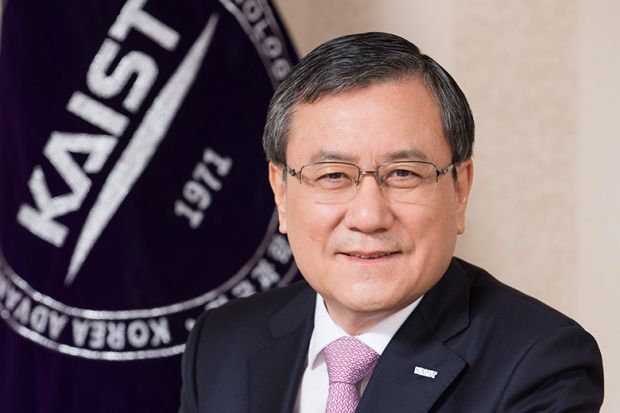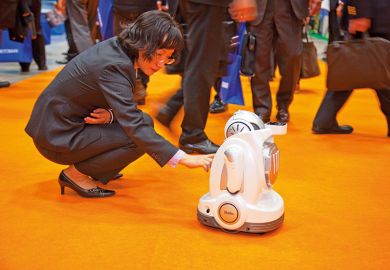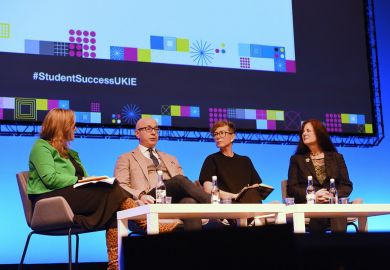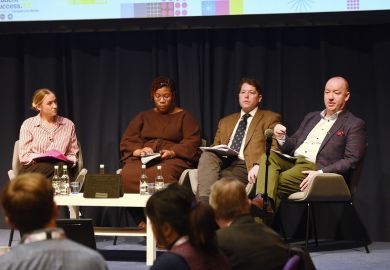Ahead of the first Times Higher Education Research Excellence Summit,taking place in Taiwan next week, which will host the launch of our Asia Pacific Ranking, we hear from keynote speaker, Sung-Chul Shin, president of the Korea Advanced Institute of Science and Technology (KAIST).
What are the unique challenges and advantages of being a university in the Asia-Pacific region?
Globalisation is definitely the biggest challenge. KAIST has made strenuous institutional efforts to address this issue for decades. Globalisation is not just about language issues, especially for an Asian university. There are still lingering cultural barriers. However, we are improving and seeing significant progress. Approximately 85 per cent of our classes are being lectured in English, and my ultimate goal is to make KAIST a bilingual campus for a more globalised environment.
Speaking of advantages, we can recruit top-quality students from neighboring countries.
What role do universities have in creating social equality?
I strongly believe that education is an essential means of empowerment and social mobility. KAIST has diligently promoted policies to help ensure greater diversity, without discriminating against anyone’s talents on the basis of gender, race, or background.
We implement an equal opportunity admission system, with special consideration given to the underprivileged, geographically-excluded groups, North Korean refugees, and many other disadvantaged groups. We recruit five percent of our freshmen from these groups under our admission system annually.
As for the gender gap, our female student population is now over 25 per cent, and we expect in the very near future the ratio will increase up to 30 percent. However, female faculty ratio stands at around 10 per cent, so we will attempt to double the ratio soon.
In addition, we work to emphasise social responsibility to our students. They are a privileged group, so they should be responsible for giving back their knowledge and talents to society in diverse ways. I am very glad that many of our students engage in the social entrepreneurship programs we are running now. That will be fruitful for ensuring social equity as well as making society better.
What is the most important issue affecting your university right now?
KAIST has now emerged as a world-class university and one of the most innovative universities in the Asia-Pacific region. However, building on our new reputation as a "world-leading" university remains a big challenge. As the first and top research university in Korea, KAIST has been the gateway to the advancement of science and technology and innovation.
We are now responsible for taking the lead in creating new knowledge that will make a global impact. This is the momentum we need to make another quantum leap to become the university which creates the most global value.
There is a great pressure in Korea for young people to get into a “top” university. Is this pressure on school students too great?
Traditionally, going to a top school was deemed the ladder to success in life. We went through the economically tough times in which diverse groups of occupations had never existed before. As a result, competition between individuals was incredibly high to get into good school and good company.
It is true that such social pressure occupied thoughts of many young students and their parents. In effect, that was also the driving force for achieving Korea’s economic growth in a relatively short period of time. But things are changing now.
We are living in a complex global economic environment. The number of new occupations creates new knowledge and new types of jobs. Even more, this new era changed the conventional paradigm of jobs and success. Successful careers take collaboration, and one must seek whom to work with, where you fit, and what you will do and how you can reach your potential.
This change of perception has begun to transform the general definition of a successful life. The government and educational institutions are working to reflect new socio-economic trend to maximize students’ creativity and their own uniqueness in many educational institutions.
However, strong competition to get into a top university seems to be a universal problem - as is also the case for the Ivy League in the US and many other regions.
South Korean universities have some of the closest links to industry. Is a lot of your job about building relationships with companies rather than focusing on educational issues?
The relationship with industry is increasingly significant, and collaboration is very important in Korea. It is a crucial source for securing students’ jobs. On top of that, we get research funding from companies and supply the pipeline of new inventions and innovation for them, in many case through collaboration projects. That could also be interpreted as our reputation of institutional performance through diverse evaluation indicators.
From the industry side, we are a very good supplier of high-caliber manpower. Therefore, a solid relationship with industry is key to the creation of added value of knowledge, as well as a critical steppingstone for technology commercialisation.
Therefore, scaling up the organic relationship with industry is part of our education and research portfolio as well as part of my job as president.
Do you think the main role of universities is to prepare graduates for the world of work?
The role of higher education is to educate the future generation and create new knowledge though research. The conventional concept of research and development (R&D) has expanded to R&DB, as it now includes business. Thus, the role of a university is also evolving. Universities should provide diverse opportunities for graduates to prepare them to contribute to society. That will be one of the ways to realise the social responsibility of a university.
If someone else was taking over your role tomorrow, what’s the most useful advice you could give them?
When I took the office in March, I made up my mind to serve our students, faculty and staff with all my heart. I would say, inspire your people with leadership that they can emotionally connected with, if possible. In addition, I think only professionalism can make the best professionals.
Who has inspired you during your career?
Dr Kun-Mo Chung, former vice president of KAIST and former minister for science and technology, is my role model and mentor. He is an internationally renowned nuclear engineer and scholar, and successful technocrat who served as the minister for science and technology twice. He still teaches at KAIST in his eighties.
I admired his visionary leadership and his successful career as administrator as well as accomplished scholar. After graduating from Seoul National University, he went to Michigan State University. In his early thirties, he was sent back to Korea as a member of the United States Agency for International Development survey team to conduct the feasibility study for founding KAIST. He wrote the proposal in the Terman Report to the USAID that the establishment of KAIST would be necessary and useful for Korea.
With $6 million dollar loan from the agency, he founded KAIST. He is the true innovator, I think.
How do you use data to make sure your university is performing well?
We are analysing the diverse data released from international evaluation institutions such as THE data and Clarivate analytics, as well as domestic institutions. Through the various indicators of data, we are keen to realise the global standard of our institution and advance our innovation competitiveness at a global level.
Find out more about our programme of academic summits
Register to continue
Why register?
- Registration is free and only takes a moment
- Once registered, you can read 3 articles a month
- Sign up for our newsletter
Subscribe
Or subscribe for unlimited access to:
- Unlimited access to news, views, insights & reviews
- Digital editions
- Digital access to THE’s university and college rankings analysis
Already registered or a current subscriber?






